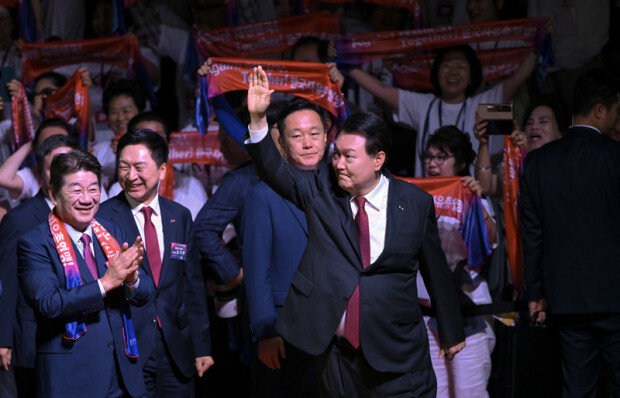Roughend up rhetoric of President Yoon
Roughend up rhetoric of President Yoon
Posted July. 01, 2023 07:57,
Updated July. 01, 2023 07:57

The political world is arguing over what President Yoon Suk Yeol said at the recent founding ceremony of the Korea Freedom Federation, “anti-state forces are harping on the declaration of the end of the war.” The Democratic Party of Korea strongly protested, saying that President Yoon defined the former Moon Jae-in government and the opposition party as “anti-state forces.” Although the presidential office said, “It is not a remark aimed at the last administration or a specific political force,” the People’s Power Party defended President Yoon’s remarks and launched an offensive against the opposition party.
The controversy surrounding President Yoon's unique harsh remarks is not new, but the ramifications of this comment are not expected to be minimal. Shortly after taking office, President Yoon's question and answer remarks on the way to work caused controversy for a while, and this remark is the result of a prepared speech. Even considering that it was part of a speech at a group event representing the conservative right, that was excessive, and given the context, anyone who heard it would have regarded it as targeting the former government.
President Yoon's remarks are also related to harsh words recently delivered by government officials. “More than 70% of the people do not know that Moon Jae-in (former president) is a spy,” said Park In-hwan, a former prosecutor and chairman of the police system development committee. Even some in the ruling party raised concerns that President Yoon's remarks about "anti-state forces" could be seen as sympathizing with Chairman Park's extreme remarks. It is not something to be taken lightly that a far-right YouTuber was nominated as the head of the National Institute for Human Resources Development for Public Officials in the recent vice-ministerial personnel appointment.
President Yoon is said to have summoned the secretaries of the presidential office, who will be sent down as vice ministers of each ministry the other day, and asked them to “fight against the predatory interest cartel.” The president’s office explained that defeating the “interest cartel” originated when President Yoon declared his participation in politics two years ago. It may be related to President Yoon's criticism of the former Moon Jae-in administration at the time, saying, "It is trying to plunder the people by extending power beyond privatization of power." In other words, it was translated as the then-presidential candidate responding to a strong call to root out the remnants of the previous administration.
This series of remarks can be seen as an expression of President Yoon's will to take the initiative in running state affairs while refining the tone of the new government in earnest with the appointment of 15 ministers and vice ministers. Also, this can be seen as a sense of despair for the huge opposition party that finds fault with the president's every move. However, the president must respond to this with a clear national agenda and specific policies, and the adoption of confrontational ideological rhetoric will only accelerate non-constructive partisan strife.
The president's strong rhetoric has a great impact but also has serious side effects. The failure of the previous administration, which advocated “eradicating the deep-rooted wrongdoers,” proves such a point. It is also undeniable that President Yoon's words reveal a hint of impatience where he feels that he must present his achievements in his second year in office, especially ahead of the general elections next year. Statements that incite confrontation between different sides of the aisle or national conflict should not be the language of a leader. Furthermore, the language of agitation and division does not fit what is represented by the conservative well.



![17년 망명 끝에, 부모 원수 내쫓고 집권[지금, 이 사람]](https://dimg.donga.com/c/138/175/90/1/wps/NEWS/IMAGE/2026/02/18/133376197.3.jpg)



